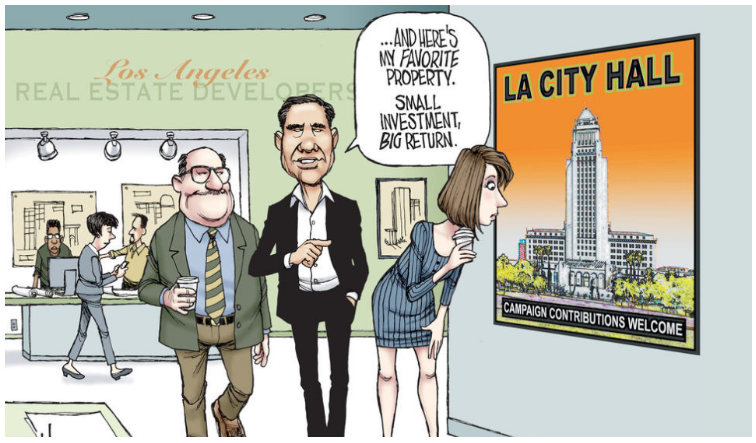CommentsDEEGAN ON LA-How much does it cost in campaign contributions for a developer to get the special approvals they want from a City Councilmember, a member of the council’s Planning and Land Use Management (PLUM) committee, or even the Mayor?
This is a rhetorical question no developer or politico would likely answer.
Why would anyone be shocked that progress is tied to payment in a city where the phrase “pay-to-play” is a job description when it comes to land use issues? According to a recent report by the New York Times, Los Angeles is “the second most corrupt city in America.” Chicago beat us for the top spot.
Councilmember David Ryu (CD4) wants to change that and help to make LA cleaner. Days after an FBI sweep netted boxes of files and electronic devices from City Hall, and cast a net that ensnared a councilmember, his wife, a former Deputy Mayor, and some downtown LA developers, the City Ethics Commission heard the alarm go off and woke up to the problem by unanimously approving a series of measures that will now go to the full City Council for a vote.
Two Councilmembers must introduce a motion to get the ethics reform ball rolling. Eight of the fifteen council members will have to vote in favor of the reforms for them to pass. It might be hard to go on the public record with a “no” vote on these ethics improvements.
Summarized by the activist group Coalition to Preserve LA, they include:
- A ban on campaign donations by developers to elected officials, starting the day a developer files an application for a project that seeks favors from the city, and lasting one year after the project (if approved) is constructed.
- A ban on donations from a developer’s entire “project team,” such as architects, attorneys, consultants, engineers, lobbyists and property owners.
- A ban on the loophole of “behested” donations to entities like the “Mayor’s Fund,” controlled solely by the Mayor, that has accumulated $35 million in “unregulated” money in the past few years, including some of the $26 million of “behested funds” from developers.
- New campaign matching funds rules that cut, nearly in half, the amount of money candidates for City Council and Mayor can raise to qualify for public matching money.
Los Angeles is not the first municipality to face these sorts of corruption questions. Ancient cities are known to have had their own tribute systems. In more recent history, some examples are New York City, that had Boss Tweed and Tammany Hall pulling the strings in the 19th century. The Pendergast Machine that corruptly ran Kansas City in the early 20th century. Huey Long was the “Kingfish” of Louisiana corruption for decades in the early 20th century. All that Los Angeles is missing to compete on this level is a publicly identified “ringleader” of corrupt practices.
Simony, the selling of ecclesiastical privileges, pardons and benefits, led to a schism in the Catholic church when Martin Luther, in the 16th century, protested the sale of indulgences by nailing his “95 Theses” to the front door of the Wittenberg Castle church in 1517. An alternative belief system, the Lutheran church, was born and became a centerpiece of the Reformation.
Could David Ryu -- who might one day knock on the door of City Hall to be the first Asian-American Mayor of Los Angeles – be our Martin Luther? He ran for office in 2015 on a pledge not to take contributions from developers, and subsequently set up a webpage for the public to track his promise. He has been pushing for this sort of reform since his election. Once in office, Ryu tried twice to advance legislation targeting the problem, but was twice rebuffed. Now, he’s spearheading the challenge with the clarion call that “Reform can-and-must-be made.” He adds that “a perception of corruption and pay-to-play politics, fueled by the outsized influence of developer money, threatens the very foundation on which we stand.”
People power and populism can help balance the books and separate the clean from the dirty at City Hall by pressuring councilmembers to vote for these ethics reforms. They can also vote in new officeholders in 2020 who aren’t so tied to business-as-usual at City Hall.
Presidential candidate Bernie Sanders and freshman Congressperson Alexandria Ocasio-Cortez are fronting Democratic Socialist-Progressive Populist movements demanding reforms by our elected officials. The trickle down from their movement may be what Los Angeles needs to help push out the corruption and clean up the rulebook.
Half the council seats, including Ryu's, are up for election in 2020. This gives an urgency to politicos and progressives to fight for primacy: Clean versus Dirty are the stakes.
In his exhortation that something must be done, Ryu says, “Doing nothing is not an option. Doing nothing is ignoring the crisis before us. Doing nothing is costing us the trust of our City’s people.”
(Tim Deegan is a civic activist whose DEEGAN ON LA weekly column about city planning, new urbanism, the environment, and the homeless appear in CityWatch. Tim can be reached at [email protected].) Edited for CityWatch by Linda Abrams.
















